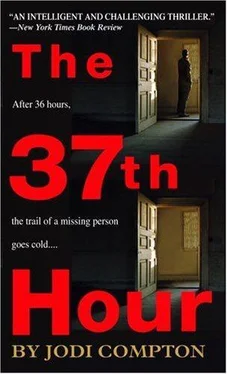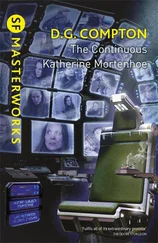There was no note.
Generally, Shiloh and I were well matched in our lack of sentimentality. But Shiloh’s abruptness, his lack of concern for convention, sometimes had the power to sting me a little. It did then.
“Well,” I said, aloud and alone. “Goodbye to you too, you son of a bitch.”
You always pay for time off with extra time at work, either before or after. On Monday I went to work early, knowing I’d need time to make up for my personal days.
Vang wasn’t there when I got in, but he’d left reports on the recent disappearances on my desk.
None of them seemed out of the ordinary to me. They could be put in a few general categories: Tired of Being Married, Tired of Living Under My Parents’ Rules, or Too Absentminded to Tell Anyone I’m Leaving Town for a While.
Vang came in with a cup of coffee around nine. “How was your time off?” he asked.
“It was all right,” I said shortly. I hadn’t told him I had gone to see Genevieve. She was living in a kind of departmental limbo, without a set date for her return. Our lieutenant was allowing it because she was a well-liked veteran. But I still didn’t want to draw the department’s attention to her absence and to the question of when she was coming back.
“What’s the big news around here?” I asked.
“There’s not a lot going on,” Vang said. “I got all the paperwork on Mrs. Thorenson. Did you see the report? I left it on your desk.”
“I read it,” I said, moving it to the top of the pile.
Annette Thorenson had gone on a weekend trip upstate with a friend, to a resort south of St. Cloud. She hadn’t come back. Nor had she told her friend anything to imply that she wasn’t going straight home to where she lived in a Lake Harriet town house with a husband and no kids. Mr. Thorenson was beside himself.
“The gasoline card’s been used,” Vang said. “ATMs have been hit four times. Twice moving eastward to Wisconsin. Twice in Madison.”
“And?” I said.
“His friends say the marriage is solid. Her friends all say it’s not. One of them, who’s recently divorced herself, said Annette asked a lot of questions in the key of: ‘What’s it like to get divorced and start over?’ ”
“See? Tired of Being Married,” I said. I’d told him about my categories.
“So I asked if Annette knew anyone in Madison,” Vang went on. “Turns out that’s where she went to school. Lived there a year afterward, working.”
“And she still has friends there?”
“I couldn’t get any names. My guess is there’s an old flame still in town. The problem is, it seems like she’s keeping a low profile now that she’s there. I gave the Madison cops her license number, hoping they’d pick her up and bring her into a station, have her call her husband and tell him flat out what’s going on. But they haven’t seen the car. And she hasn’t used the ATM in the past few days.”
“ ‘I’ll buy, sweetheart,’ ” I said. The old flame was apparently picking up the checks.
“Yeah,” Vang said. “But Mr. Thorenson doesn’t believe any of it. He says someone must be forcing her to drive east and get money out of cash machines. I’ve tried to tell him that everything points to her taking a time-out from her life here, but he’s not convinced. He calls here a lot and the word negligence keeps coming up. He wants to speak to my supervisor.”
“I suspect you have a pink message slip for me.”
“Several.”
“I just need one.”
I called Mr. Thorenson at his office and listened while he recounted his unsatisfying conversations with Vang. He was unhappy when I told him that Vang had done everything I would have.
“It might be time to bring in some private help,” I said. “I can give you the phone numbers of several very competent investigators,” I said.
“At this point, I’m thinking of contacting a lawyer, Miss Pribek,” Thorenson responded, and hung up.
Too bad, I thought. I knew more lawyers than I did PIs; I could have made a referral there, too. Miss Pribek. If that pejorative courtesy title was his idea of subtle psychological warfare, I could see why his wife might have gotten tired of him.
The highlight of the day was a trip across town to examine the clean, empty apartment of a young man with a lot of gambling debts. Another person who’d left town of his own volition, I thought.
“Did you see the vacuum marks on the carpet?” I asked Vang on the way back. “Track-covering. Guilty conscience. People often clean when they’re not planning on coming back.”
“Yeah,” he said. “My wife even cleans house before we go on vacation, so in case we’re in a fatal on the highway, our families won’t come here and see a dirty house. It’s her version of wearing clean underwear.”
We fell silent and I thought about the evening ahead.
If Genevieve had been on the job, she would have suggested we do something after work tonight, my first night without Shiloh around. She would have known that I’d gotten unused to living alone, but she wouldn’t have made a big deal of it.
Maybe it was time for me to get to know my new partner a little better.
“You want to get a cup of coffee after work?” I asked, steering down the spiral ramp at the garage downtown.
Vang looked at me sidewise, maybe surprised. “Thanks,” he said. “But I’ve got to get home for dinner. Some other time, okay?”
“You bet,” I said, sounding old and Minnesotan to myself.
I stayed late at work, occupying myself with a motley assortment of small tasks that probably could have waited. When I ran out of those, I went to the courts where Hennepin County people regularly played pickup basketball, hoping to get recruited into a game. Shiloh and I had been among the regular players.
But nobody that I recognized was there. Instead, a group of rookies was playing two-on-two. They looked like they could have come straight from the U of M’s women’s team: all female, all tall, three-fourths blonde. They were also evenly matched; there wasn’t room for an extra player, even had we known each other.
A small thing lifted my spirits when I returned home: there was a basket of tomatoes on the stoop. No note, but none was needed. Mrs. Muzio kept a prodigious garden all summer long, and vegetables turned up on our steps regularly. Standing on the kitchen doorstep at the back of the house, I looked over and saw the slow, wild demise of Mrs. Muzio’s kitchen garden: a sunflower in death was half bowed under its own weight; the herbs had flowered and bolted. But the tomato plants were still heavy-laden with the last fruits of the season.
I doubted Mrs. Muzio knew Shiloh was gone. She left tomatoes more often than anything else, because she knew how much Shiloh liked them. Tomato sandwiches were his staple when he was too busy to cook. Often, when he came home on a quick break from work, he’d make one and eat it standing over the sink.
I pushed the strap of my shoulder bag onto a secure spot higher on my shoulder, held the basket in one arm against my ribs, and opened the door with my other hand.
Shiloh had said he’d call to give me a number where he could be reached at Quantico, but I didn’t look at the answering machine right away. First, I put Mrs. Muzio’s tomatoes away in the refrigerator, fixed myself a Coke over ice, went to change out of my work clothes. Only then did I go to the machine to find Shiloh’s message.
There was none. The tiny red eye, often flashing when we’d both been out all day, was dim, unlit.
Well, okay, he’s busy. He’s been traveling, and then getting used to his new surroundings. The phone lines work both ways, you know. Call him instead.
That was going to pose a problem: I still didn’t have a phone number for him.
Читать дальше












